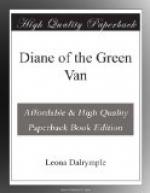CHAPTER XX
THE ROMANCE OF MINSTRELSY
“I am glad to see that you are better,” said Diane pleasantly.
The minstrel, who had bathed his hands and face in the river until they were darkly ruddy, bowed with singular grace and ease. That he was grave and courtly of manner and strikingly handsome to boot, Diane had already noticed with a flash of wonder.
“I owe you much,” said he simply. “My life perhaps—”
“I am sure,” protested Diane, “that you greatly overrate my small service.”
“Day by day,” exclaimed the minstrel sombrely, “I travel the summer roads in quest of health.”
Not a little interested, Diane raised frankly sympathetic eyes to his in diffident question.
“The music?” said the minstrel with his slow, grave smile. “Is there not more romance and adventure in the life of a wandering minstrel than in that of an idle seeker after health? In the open one finds happiness, health, color and life!”
Diane felt a sudden tie of sympathy link her subtly to this mysterious nomad of the summer road. Simply and naturally she spoke of her own love of the wild things that filled the sylvan world with life and color.
“You look much then at the wild flowers!” he exclaimed delightedly. “There was a leaf back there on a mountain, the edge of white, a white blossom in the heart like a patch of snow—”
“Snow-on-the-mountain!” exclaimed Diane. “I’ve looked for it for days.”
“It shall be my ambition to bring you some,” said the minstrel gallantly. “I shall not forget.”
Diane glanced furtively at the picturesque attire which her nomadic guest wore with a certain dashing grace, and marveled afresh. It was of ragged corduroy with a brightly colored handkerchief about the throat which foiled his vivid skin artistically. Indeed there was more of sophistication in the careful blending of colors than even the normal seeker after health might deem expedient for his purpose.
“It is to few—to none indeed save you that I have confided the secret of my minstrelsy,” he said deferentially a little later. “Illness, love of adventure, a longing to brush elbows with the world, a hunger for the woodland—in the eyes of unromantic men these things are weaknesses. You and I know differently, but nevertheless it is best that I seem but a poor vagrant grinding forth a hapless tune for the coppers by the wayside.”
The minstrel gazed idly at the hay-camp.
“One does not quite understand,” he suggested raising handsome eyebrows in subtle disapproval; “the negro, the hay—the curious camp?”
Diane recalled Philip’s unfeeling attitude of the night before.
“A happy-go-lucky young man with a taste for hay,” she said. “I know little of him.”




